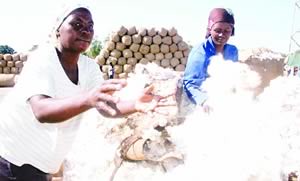
Zimbabwe cotton farmers earned from this year's yield according to a recent article in the state newspaper The Herald. The land redistribution program in this Southern African state has provided farms to people dispossessed by colonialism., a photo by Pan-African News Wire File Photos on Flickr.
Farmers oppose tobacco ban
Tuesday, 08 January 2013 00:00
Obert Chifamba recently in MHONDORO
Zimbabwe Herald
TOBACCO farmers in Mhondoro communal lands have described the World Health Organisation’s proposed ban on tobacco production as hypocritical and meant to harm economies not on good terms with countries such as Britain and the United States.
Britain and the United States are part of the five permanent members of the United Nations that also include Russia, China and France and are actively involved in funding most UN bodies and projects to easily influence their decisions.
A farmer from Chinengundu Village under Chief Mashayamombe, Mr Edward Marimo, said the influence of the British and the Americans could not be ruled out especially now that the economy of Zimbabwe — their biggest enemy — is recovering with tobacco playing a very significant role. “Remember they are the same people who tried to stop Zimbabwe from trading in its diamonds because they feared its economy would recover.
Now that they have failed in that route they are trying to ruin the next best thing ever to happen to the Zimbabwean economy,” he said recently.
Another farmer from Churu Village (also under Mashayamombe), Mr Joel Samasuwo, concurred saying the ban was tantamount to taking away a means of socio-economic empowerment to the generality of Zimbabwe after having failed to sabotage the national economy through banning trade in diamonds.
“As you can see many people in our villages have made vast improvements to their lives. Many have bought cars, motorbikes, farming implements, cattle and other livestock units while they have also managed to send their children to good schools and build decent houses for themselves,” he said. Mr Samasuwo said such feats were irking those opposed to the land reform so there were very high chances they could try to influence the WHO as they are among the major financiers of most UN bodies, the WHO included.
Another farmer who asked not to be named also added that the proposed tobacco ban would seriously affect rural communities that survive on agriculture and render less effective the land reform the Government implemented. Tobacco currently contributes about 15 percent to Zimbabwe’s Gross Domestic Product and smallholder farmers from communal, resettlement and A1 farming areas have been actively involved.
Recently, the Association of Sadc Chambers of Commerce and Industry urged member states participating at the World Health Organisation Framework Convention on Tobacco Control’s fifth conference held in Korea to oppose the proposal for total banning of tobacco production. ASCCI said the proposals known as FCTC Article 17 and 18 sought to pre-emptively phase tobacco farmers out of production to alternative crops such as food crops.
These include recommendations for governments to ban minimum support prices for tobacco leaf auctions.They also recommend the restriction of production by regulating the season in which tobacco could be grown and to reduce the farming area allocated to tobacco.
Armyworm outbreak
Monday, 07 January 2013 00:00
Zimbabwe Herald
An armyworm outbreak has hit some parts of the country, destroying hundreds of hectares of maize. Here, a Mount Darwin farmer Mr Tapfumaneyi Nhete assesses his crop which was under attack.
Severe armyworm outbreak has hit four of the country’s 10 provinces affecting hundreds of hectares of maize and pastures. The outbreak — reported in Mashonaland West, Mashonaland Central,
Matabeleland North, Manicaland and Midlands provinces — has raised fears that hundreds of hectares of maize and pastures could be destroyed if appropriate measures are not taken.
This will further affect the anticipated low maize yield that had been caused by delayed onset of rains.
Agritex Plant Protection Research Institute head, Dr Godfrey Chikwenhere, confirmed the armyworm outbreak saying the pests, first discovered in Mashonaland Central province, were spreading at an alarming rate across the country.
He said his department was distributing Carbaryl and boom sprays required for containing the outbreak, adding that though over 2 800kg of the chemical had been bought, it was not enough, considering the magnitude of the outbreak.
“This year we were prepared to deal with any armyworm outbreak as we have been able to procure Carbaryl, which is used to kill the pests. We are, however, not confident that the chemical will be enough,” he said.
No comments:
Post a Comment